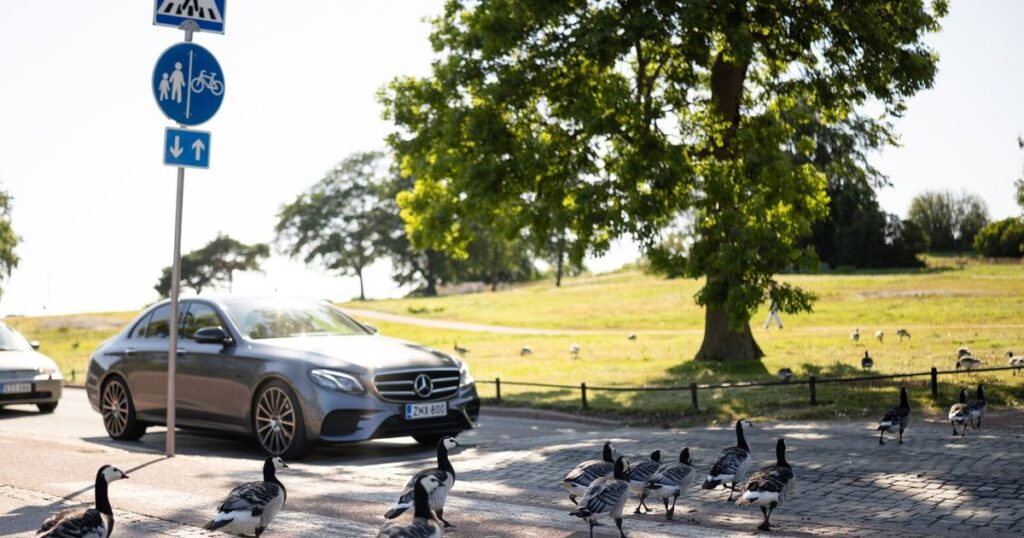Each summer, sun-starved Finns flock to Hietsu Beach, a sandy stretch in Helsinki, to exercise, splash and attempt to tan.
Amid a late July, record-breaking heat wave, a very different flock has also been stalking the surf around Finland’s capital: barnacle geese — white-faced, black-backed and ever-present. At night, they roost by the water’s edge. Come daytime, as people spread out their towels, they waddle away, leaving small mountains of excrement in their tracks.
“There can be a shocking amount of poop,” acknowledged Jukka Lundgren, the manager of Helsinki’s public beaches, who has spent 15 of his 18 years on the job trying to keep the sand from looking like a goose litter box.
Now, after Sisyphean summers facing down the fowl’s feces, he thinks that he just may have found a solution: a wheeled cage with a strong resemblance to an old-fashioned hand lawn mower that is meant to sift the dirtied sand and whisk up only the offending feces.
The contraption may be Helsinki’s most innovative poop-fighting effort yet. It is being tested this summer on about half the city’s 25 public beaches. It was designed in-house by beach staff members, who drew inspiration from a public competition last year meant to crowdsource poop-scooping ideas.
Finns are hardly alone in their fight against geese droppings, which can carry dangerous germs like E. coli and salmonella. In other places, officials fight the problem at its source: the birds themselves. In recent years, Canadians have tried to relocate the geese, New Yorkers hired a patrol dog and Californians moved to cull them.
But Finland does not allow culling, and hunting geese in urban Helsinki would not be a feasible option anyway.
The Finns are desperate for solutions because their two months of summer are precious. They live so far north, that’s about all they get.
However brief, the summers they do get can sometimes be unpredictably hot, with this past Sunday marking the 16th consecutive day that temperatures exceeded 30 degrees Celsius, or 86 degrees Fahrenheit, somewhere in Finland — a record.
So on a recent afternoon — a warm day in a city where anything over 77 degrees Fahrenheit (25 Celsius) is considered hot — Pauli Puirava biked with his wife and two children to Hietsu Beach, whose formal name is Hietaranta. They brought some nuts and a few juice boxes for their children, 5 and 8.
“The summer is so short,” said Puirava, an entrepreneur, pharmacist and restaurateur. “We really have to make the most out of it.”
Helsinki’s humans are not the only ones who gravitate to the beach in summer. Last July, according to the Finnish Environment Institute, researchers counted about 5,300 geese in the Helsinki area.
The plump birds are everywhere: They jaywalk across bike paths, swagger through crosswalks barefoot like the Beatles, preen in the parks and sometimes strut between office buildings and cultural landmarks in the city center.
In parks, the problem can be even worse, with the droppings matting the grass and squishing into the treads of shoes.
At the beach, sunbathers must check the sand before they lay down their blankets. Beach volleyball players hope that a dive does not bring them face to face with you know what. And parents, like Puirava, keep a watchful eye out so their young children do not end up putting the feces in their mouths.
“You have to watch your every step,” he said. “Wherever you go outdoors in Helsinki, there is nowhere without goose poop.”
To keep up with the cleaning demands, the ranks of summer maintenance workers have grown in the past decade, Lundgren said. Some beaches can see well over 40 pounds of excrement a day, he said.
His team keeps looking for new solutions. They once tried to mix the poop into the sand, which just dirtied the water, he said. They tried to scare the geese by broadcasting the sounds of sea eagles, but the geese quickly got wise to it.
He even considered hiring gig workers, in this case skilled patrol dogs, as have other Finnish cities. But, he said, the few eligible dogs would have been too expensive. “And,” he lamented, “they would have been able to get there only a couple of times per week.”
The latest hope was the new wheeled contraption that the summer maintenance crew at Hietsu Beach rolled out to use, said crew leader Minni Aakko.
But they soon found it was heavy, she said, dragging on wet sand. Now, the machine that was supposed to be the solution mostly sits in the storage room.
So Aakko has returned to the old-fashioned method: scooping up goose poop with a spade and rubbery gloves.
She finds the work almost meditative, she said. But the smell — grassy, a little mildewy and undeniably fecal — can linger.
“It’s not bad work,” she said. “But it’s not my favorite job here.”

